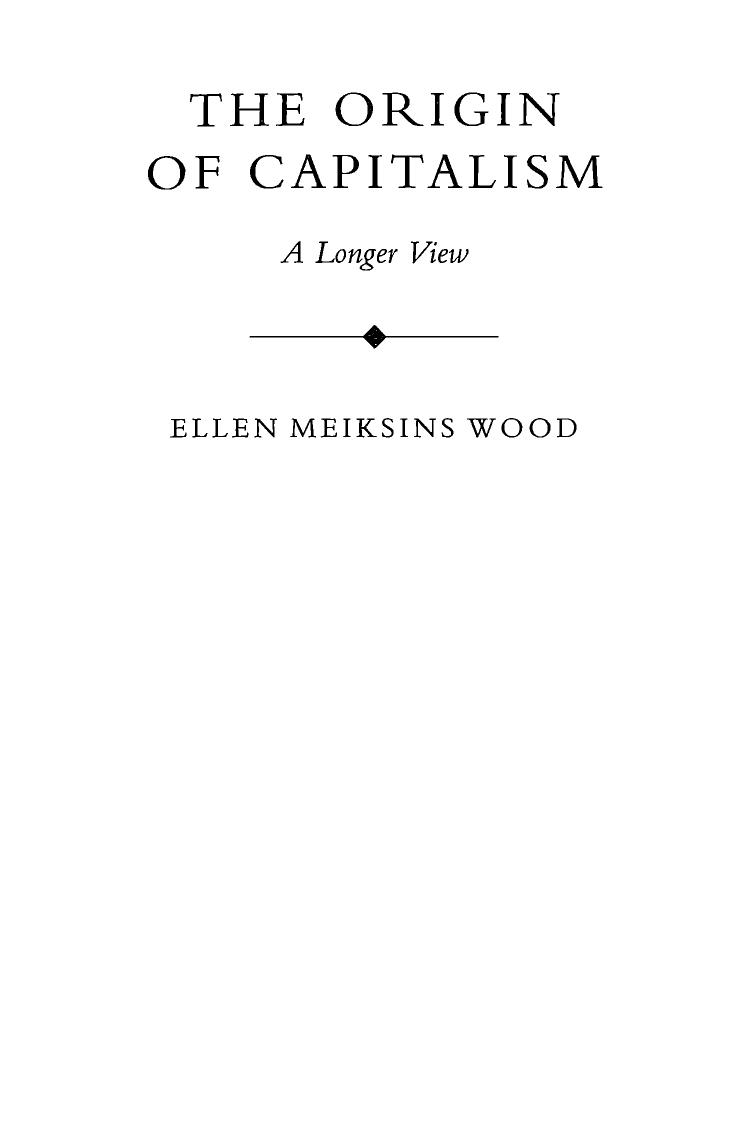The Origin of Capitalism: A Longer View by Ellen Meiksins Wood

Author:Ellen Meiksins Wood
Language: eng
Format: epub, pdf
Publisher: Verso
Published: 2016-02-07T16:00:00+00:00
ENCLOSURE
This brings us to the most famous redefinition of property rights: enclosure. Enclosure is often thought of as simply the fencing in of common land, or of the ‘open fields’ that characterized certain parts of the English countryside. But enclosure meant not simply a physical fencing of land but the extinction of common and customary use rights on which many people depended for their livelihood.
Early enclosures were sometimes undertaken by, or with the agreement of, smaller fanners and not always to their detriment. But the first major wave of socially disruptive enclosure occurred in the sixteenth century, when larger landowners sought to drive commoners off lands that could be profitably put to use as pasture for increasingly lucrative sheep farming. Contemporary commentators held enclosure, more than any other single factor, responsible for the growing plague of vagabonds, those dispossessed ‘masterless men’ who wandered the countryside and threatened social order.7 The most famous of these commentators, Thomas More, though himself an encloser, described the practice as ‘sheep devouring men’. These social critics, like many historians after them, may have overestimated the effects of enclosure at the expense of other factors leading to the transformation of English property relations. But it remains the most vivid expression of the relentless process that was changing not only the English countryside but also the world: the birth of capitalism.
Enclosure continued to be a major source of conflict in early modern England, whether for sheep or increasingly profitable arable farming. Enclosure riots punctuated the sixteenth and seventeenth centuries, and enclosure surfaced as a major grievance in the English Civil War. In its earlier phases, the practice was to some degree resisted by the monarchical state, if only because of the threat to public order. But once the landed classes had succeeded in shaping the state to their own changing requirements – a success more or less finally consolidated in 1688, in the so-called ‘Glorious Revolution’ – there was no further state interference, and a new kind of enclosure movement emerged in the eighteenth century, the so-called ‘Parliamentary enclosures’. In this kind of enclosure, the extinction of troublesome property rights that interfered with some landlord’s powers of accumulation took place by acts of Parliament. Nothing more neatly testifies to the triumph of agrarian capitalism.
Download
The Origin of Capitalism: A Longer View by Ellen Meiksins Wood.pdf
This site does not store any files on its server. We only index and link to content provided by other sites. Please contact the content providers to delete copyright contents if any and email us, we'll remove relevant links or contents immediately.
The Secret History by Donna Tartt(16623)
The Social Justice Warrior Handbook by Lisa De Pasquale(11489)
Thirteen Reasons Why by Jay Asher(7788)
This Is How You Lose Her by Junot Diaz(5772)
Weapons of Math Destruction by Cathy O'Neil(5037)
Zero to One by Peter Thiel(4824)
The Myth of the Strong Leader by Archie Brown(4789)
Promise Me, Dad by Joe Biden(4447)
Beartown by Fredrik Backman(4418)
Stone's Rules by Roger Stone(4415)
How Democracies Die by Steven Levitsky & Daniel Ziblatt(4398)
The Fire Next Time by James Baldwin(4342)
100 Deadly Skills by Clint Emerson(4077)
A Higher Loyalty: Truth, Lies, and Leadership by James Comey(4032)
Rise and Kill First by Ronen Bergman(4012)
The David Icke Guide to the Global Conspiracy (and how to end it) by David Icke(3881)
The Farm by Tom Rob Smith(3872)
Secrecy World by Jake Bernstein(3782)
The Doomsday Machine by Daniel Ellsberg(3731)
